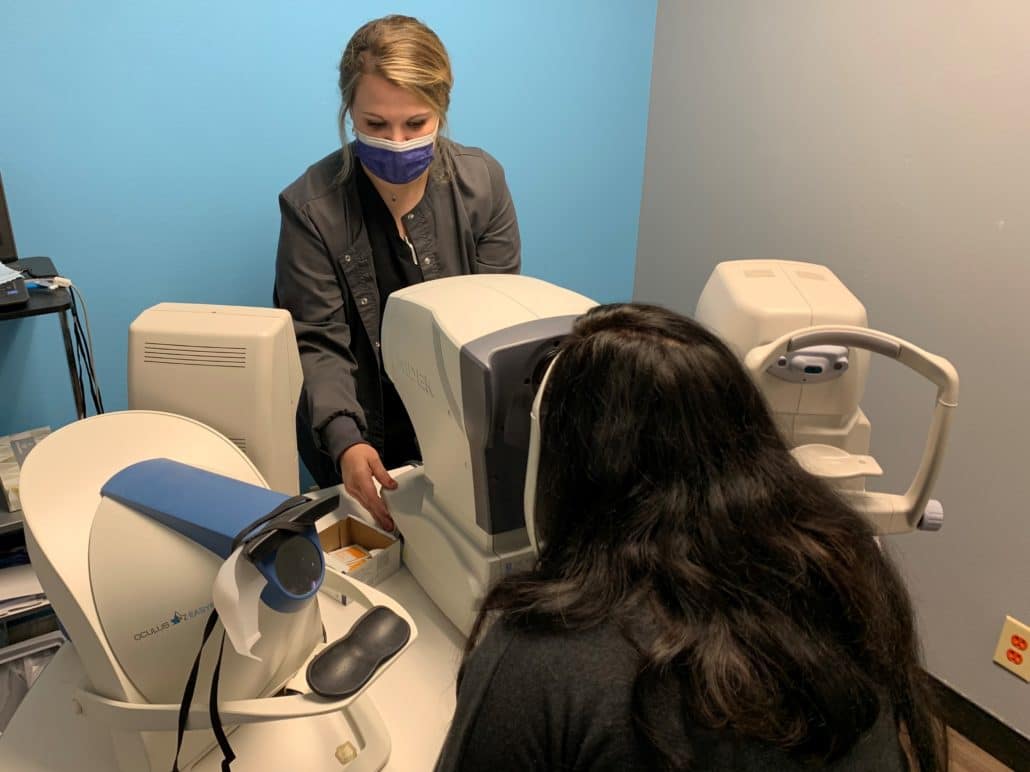Oscar-winning (and tough-as-nails) actress Bette Davis once owned a pillow with the aptly embroidered saying, “Old age ain’t no place for sissies.” It’s true: Health challenges tend to increase as we get older. But you can take steps now to protect your well-being in the future—including for your eyesight.
First, the bad news: According to Dr. Aubrey Fulton, OD, with Hattiesburg Eye Clinic, there are a number of eye conditions whose risk increases as we age. “Aging itself doesn’t necessarily cause impairment, but there are major diseases related to aging that can, namely age-related macular degeneration, diabetic retinopathy, glaucoma and cataracts.”
Dr. Fulton says some conditions like cataracts can be corrected, while others are incurable like glaucoma and must be managed to limit eye damage.
But therein lies the good news: If a condition is diagnosed early, treatment could lessen the impact on your eyesight. Such early detection is possible, even before you notice symptoms, through a comprehensive eye exam.
“This is more than a screening,” says Dr. Fulton. “It’s a complete examination with dilation. There are specific tests within the exam that can detect signs of various conditions that could eventually impair vision.”
Eye doctors recommend that children have an exam before they turn one, right before school, and then every two years thereafter. And unless you have a family history of eye disease or already have a confirmed case, you should begin annual exams by age forty.
Besides eye exams, Dr. Fulton says there are other things you can do to protect your eyesight as you age.
Eat an “eye-friendly” diet. “We often see the eyes separate from the rest of the body, but in reality, what’s good—or bad—for the body is usually the same for the eyes,” says Dr. Fulton. Antioxidants like lutein or zeaxanthin in particular are extremely beneficial for eye health, which you can get through supplements or eating dark greens, berries or cruciferous vegetables like broccoli.
Don’t smoke. A tobacco habit is tough on the body, says Dr. Fulton. The body reallocates defensive resources from other areas, including the eyes, to fight smoking’s effect from other areas. Smoking also increases oxidants, the damaging substances that antioxidants help counteract, and harms the eye’s natural UV light blockers that protect the eyes from the long-term effect of sunlight.
Wear UV-blocking eyewear. Speaking of which, frequent exposure to the sun’s UV light can damage the eyes over time. “Think of an old car sitting out in the sun as its color fades over time,” says Dr. Fulton. “Something similar can happen with our eyes—and it can worsen as we age.” To protect your eyes, wear sunglasses, prescription glasses or contacts that block both UVA and UVB rays, as well as a hat to boost protection.
Know your family history. Some of these eye conditions can have a genetic connection. If you have a close relative like a parent or sibling with macular degeneration, glaucoma or diabetes, then consider starting annual eye exams in adolescence or early adulthood. Early detection could help preserve your eyesight later in life.
Hattiesburg Eye Clinic is joining the American Academy of Ophthalmology this May to recognize Healthy Vision Month. Taking steps like annual eye exams, diet and sun protection will help keep your vision in optimal health, especially in your latter years.
For more information about maintaining eye health throughout your life, visit our webpage [https://www.hattiesburgeyeclinic.com/]. To learn more about how Hattiesburg Eye Clinic can improve your vision health, call 601-268-5910 (or toll-free 800-624-8254) or schedule a consultation with us.

